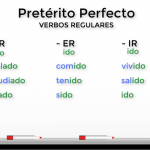How to advance to an Intermediate level of Spanish
Hola amigos y amigas:
Today we will continue our journey through the PBO levels. This time, we’ll look at how to advance to an intermediate level of Spanish!
1 – Increase the complexity of your speech.
How do you achieve this?
- Start telling stories to a friend, to yourself or in class. You need to talk less about short daily experiences, and tell more stories.
- Read the news. It might be a bit challenging, but it’s an excellent way to broaden your vocabulary. The podcast News in slow Spanish is also amazing!
- In addition, start talking about complex subjects. They can be about things you’re struggling with at the moment, controversial subjects, current events, etc.
2 – Diversify your knowledge of tenses.
How do you achieve this?
- To advance to an intermediate level of Spanish, talk about the past more often (to use the preterit and the imperfect). Telling stories, which we advised before, is a perfect way to practice the past tenses, as you will have to use several of the past tenses in each story.
- Dabble in the future tense. Get used to it, as native speakers use it a lot alongside the construction “ir + a + verb” (voy a beber or beberé).
- Also, dabble in the conditional tense. It will allow you to put together more complex sentences, and to express things you “would” do.
3 – Increase you comprehension.
How do you achieve this?
- Watch shows in Spanish. You will not understand everything, but you’ll get used to the speed of natives. (Tip: It’s best to start watching series/telenovelas, since the stories develop over time, unlike in a movie, where everything happens so quickly – there are TONS of Spanish language shows on Netflix).
- Read more in Spanish. It is a great way to get acquainted with verb tenses, learn vocabulary and discover new expressions. Caro is a huge fan of audiobooks, which also allows you to learn to understand native speakers with more ease. She uses Audible, but you can also listen to books for free on some websites and on YouTube.
- Another way to advance to an intermediate level of Spanish is to talk to Spanish speakers. Go beyond greetings. Try to have longer and more complex conversations. (You could ask them: Why did you move to San Diego? What do you like and dislike about San Diego? What do you miss about your country?)
We hope that our How to advance to an Intermediate level of Spanish blog was useful! Let us know what you think in the comment section on Facebook.
For everyone who is in B1: next week we’ll find out ways to move up to B2.
¡Les deseo una buena semana!
Octavi











